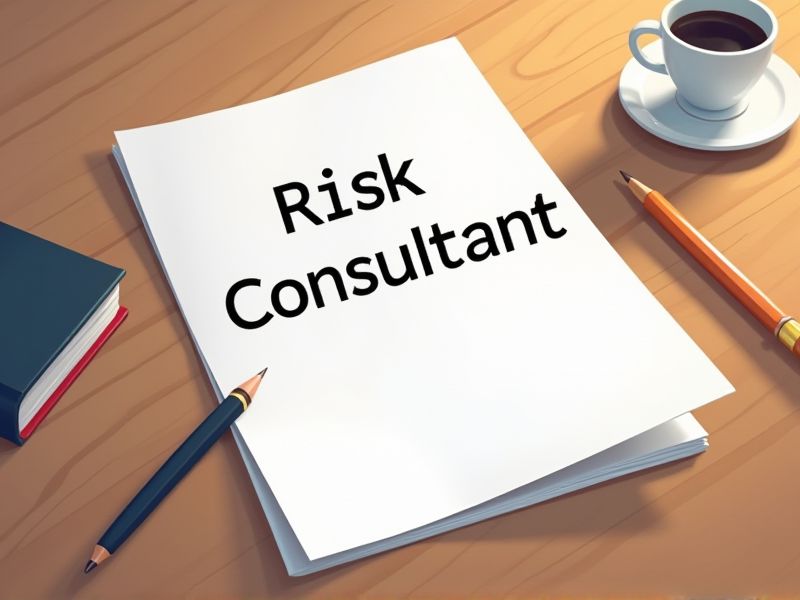
Risk Consultants face complex challenges that require specialized expertise and credibility. Certifications validate a consultant's knowledge of industry standards and practices, enhancing trust in their recommendations. They also facilitate professional growth by keeping consultants updated with the latest risk management strategies and technologies. Essential certifications for Risk Consultants include those in risk management, finance, and compliance.
Certified in Risk and Information Systems Control (CRISC)
Having the CRISC certification enables a risk consultant to effectively identify and manage enterprise IT risks, which directly enhances their capability to safeguard organizational assets. Employers often prioritize professionals with CRISC certification as it signifies a standardized understanding of risk management principles and practices. A consultant with CRISC certification gains credibility and trust in their ability to communicate risk management strategies with stakeholders. Furthermore, CRISC-certified consultants are equipped to align IT risks with enterprise strategies, directly impacting the organization's success and resilience.
Certified Information Systems Security Professional (CISSP)
Companies face escalating cyber threats, leading them to prioritize hiring professionals with strong information security credentials. Having a Certified Information Systems Security Professional (CISSP) certification provides assurance of an individual's expertise in dealing with intricate security challenges. Organizations look for risk consultants with CISSP credentials as they imply a broad-based understanding of security practices and regulatory requirements. The certification supports an individual's ability to design, implement, and manage a best-in-class cybersecurity program needed for strategic risk consulting.
Certified Information Systems Auditor (CISA)
A Certified Information Systems Auditor (CISA) is needed for a Risk Consultant to ensure expertise in evaluating and assessing information system's effectiveness, which is critical for identifying potential risks. The certification provides a standardized credibility that assures clients of the consultant's proficiency in maintaining information security and compliance with industry standards. Understanding complex IT environments and their vulnerabilities becomes easier with CISA, enabling informed decision-making and strategic risk management. CISA certification equips the Risk Consultant with current methodologies and tools essential for auditing and mitigating risks in evolving digital landscapes.
Certified Information Security Manager (CISM)
Risk consultants manage and assess potential threats to an organization's information and data systems. Earning a Certified Information Security Manager (CISM) credential equips these consultants with specialized knowledge in IT security management. This certification is recognized for elevating an individual's ability to develop and manage effective security strategies. Organizations prefer CISM-certified professionals, as they demonstrate proven expertise in risk management, assurance, and governance.
Financial Risk Manager (FRM)
Financial Risk Managers are crucial for risk consultants because they bring specialized knowledge in assessing market, credit, and operational risks. Their expertise allows for the development of tailored strategies aimed at mitigating potential financial threats to organizations. They utilize various risk management tools and methodologies, enhancing the accuracy of risk forecasts. Having a Financial Risk Manager ensures comprehensive analysis and informed decision-making, safeguarding a company's financial health.
PMI Risk Management Professional (PMI-RMP)
The PMI Risk Management Professional (PMI-RMP) credential provides demonstrated authority in identifying and assessing project risks effectively. Holding the PMI-RMP enhances a risk consultant's credibility and ensures alignment with industry standards and best practices. It equips professionals with the skills to develop comprehensive risk mitigation strategies, reducing potential project disruptions. Employers seeking risk consultants prioritize those with PMI-RMP certification due to its emphasis on proactive risk management methodologies.
ISO 31000 Risk Management Certification
ISO 31000 Risk Management Certification equips risk consultants with a structured framework to identify, assess, and manage risks effectively, enhancing their decision-making capabilities. The certification demonstrates an individual's commitment to industry standards, often crucial for attracting clients who prioritize adherence to global benchmarks. Organizations increasingly seek consultants who are certified, as they are perceived to have a deeper understanding of systematic risk management processes. Achieving this certification can also lead to career advancement opportunities, as it validates the consultant's expertise and dedication to maintaining high professional standards.
Certified Risk Manager (CRM)
Becoming a Certified Risk Manager (CRM) equips a Risk Consultant with specialized knowledge to effectively identify and assess potential threats to an organization. This certification validates a professional's ability to develop comprehensive risk management strategies, enhancing decision-making processes. Having a CRM ensures adherence to industry standards, which may build trust with clients and stakeholders. Organizations often prefer or require CRMs to minimize financial losses and safeguard against unforeseen challenges.
Six Sigma Black Belt
A Six Sigma Black Belt equips a risk consultant with advanced analytical tools to identify underlying process inefficiencies that might pose risks. Expertise in Six Sigma methodologies enables the consultant to implement effective solutions, thereby reducing variability and potential risk factors in business processes. The structured approach of Six Sigma helps in quantifying risks and improves decision-making accuracy. Risk consultants with this certification can lead cross-functional teams more efficiently, enhancing organizational resilience and strategic risk management.
Certified Fraud Examiner (CFE)
Certified Fraud Examiners (CFEs) possess specialized knowledge in fraud detection and prevention, directly supporting risk consultants in identifying potential threats. CFEs systematically investigate potential vulnerabilities within an organization, enabling the development of robust risk management strategies. The expertise of CFEs in financial forensics aids in the accurate assessment of risk exposure, enhancing decision-making processes. Incorporating CFEs into risk consultancy elevates the overall capacity to safeguard organizational assets against fraudulent activities.
Summary
You might find increased trust in your expertise from clients when you obtain relevant certifications as a risk consultant. This recognition likely opens doors to more lucrative job opportunities and potential career advancements. Certification can equip you with specialized knowledge, enhancing your ability to manage and mitigate risks effectively for your clients. Your certified status may lead to higher compensation, reflecting your expanded value in the field.
